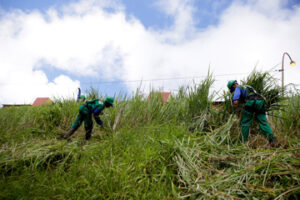Brush Clearing is the process of removing overgrown vegetation such as bushes, shrubs and small trees from an area. It has several benefits including enhancing property aesthetics, reducing fire risk and improving soil health.

Here are some tips to keep in mind when performing brush clearing on your own or with a professional.
Brush clearing is a necessary and important aspect of land management. It helps reduce fire risks, controls unwanted plant growth, and improves the overall aesthetic of a property. It is also an excellent method for preparing land for various uses. However, it is a complex process that requires careful planning and preparation. Whether you are clearing a small area of overgrown vegetation or a large swath of woodland, it’s essential to follow the proper safety precautions to avoid injury and damage to your property.
In addition to ensuring that the work is completed safely, it is important to make sure that all debris is properly disposed of. This can be done by burning, transporting to a waste facility, or using a wood chipper. It is also advisable to wear protective clothing and equipment such as gloves, eye protection, and sturdy work boots. It is recommended that you take frequent breaks and stay hydrated during the process. It is also a good idea to wear long sleeves and pants to protect yourself from poisonous plants such as poison ivy, oak, and sumac.
The first step in the brush clearing process is to inspect the area and determine what type of vegetation needs to be removed. This will help you plan for the proper methods and equipment for completing the task. You will also need to obtain any necessary permits and comply with local regulations.
It is best to clear brush in winter, when the ground is frozen. This will minimize soil disturbance and allow for a more thorough job. It will also be less likely for you to encounter snakes or other pests. In addition, it will be easier to prune and rake because the vegetation will be more compact.
Professional brush clearing services have the expertise and equipment to remove vegetation quickly and efficiently. They can provide a complete range of services, including site inspection, clearing, and debris removal. In addition, they can also assist with land management to prevent rapid regrowth of unwanted vegetation. If you need assistance with brush clearance, consider hiring a professional service such as Rancho Tree Care, which provides dependable and eco-friendly clearing services throughout Southern California.
Health
Brush clearing is an important part of land maintenance. Not only does it make a property look more visually appealing and well-cared for, but it also increases its market value and makes it easier to use for activities like grazing, hunting, or construction. Additionally, it reduces pest infestation, which can be costly and damaging to homes and crops. Overgrown brush provides hiding spots and breeding grounds for rodents and snakes, which can carry diseases and inflict damage to livestock or property. Regular brush clearing eliminates these conditions, reducing the number of pests on your property.
Additionally, overgrown brush can obstruct visibility around driveways and roads, which can pose safety hazards for pedestrians or drivers. Professional trimming encourages healthy growth, which improves airflow, sunlight penetration, and nutrient distribution to the grass and other vegetation on your land. It also helps remove invasive species, which compete with native plants for resources and can decrease biodiversity. Brush clearing can also help reduce fire hazards in dry conditions, which is common in the Texas Hill Country. This service is especially crucial for landowners in rural areas who want to ensure their properties are safe and able to be used for various purposes.
Environmental impact
Brush clearing involves the removal of unwanted vegetation from a land surface. This process is necessary for many reasons, from fire hazard reduction to improving the aesthetics of a property. However, it’s important to understand the environmental impact of brush clearing and how to minimize it.
The first step in brush clearing is to identify the areas that need to be cleared. This can be done by walking the property and assessing the level of vegetation that needs to be removed. In addition, the location of the area can affect the type and size of equipment needed for the job. For example, a large area may require more power tools than a small area. It is also important to consider the climate and weather conditions of the area. If it’s cold or rainy, the ground will be more slippery and difficult to work on, making the clearing process more difficult.
Once the brush is removed, it’s important to dispose of it properly. This will reduce the risk of soil erosion and pollution from the waste. Additionally, if the brush is used for mulching or firewood, it can help preserve the soil and improve its quality. In addition, hiring professional clearing services will ensure that the clearing process complies with local regulations.
In addition to the ecological benefits of brush clearing, it can improve the appearance of a property and increase its market value. It can also be used to create a wildlife habitat and prevent pest infestations. Overgrown brush provides shelter for rodents and ticks and serves as a breeding ground for fungus and other pests. Clearing the brush will prevent these problems and provide a healthier, more aesthetically pleasing outdoor space for people and animals.
There are a variety of brush-clearing methods, including manual clearing with hand tools and mechanical clearing with mulchers or other machinery. Hand tools are often easier to use and offer more precision. However, they are also more time-consuming and labor-intensive than power tools. Regular maintenance of these tools is essential to prolong their life and improve efficiency. The blades on brush cutters should be kept sharp to avoid damage and clogging. It’s also a good idea to rent a dumpster for debris collection, which will save time and money.
Equipment
Brush clearing equipment helps professionals and contractors tackle the job efficiently. Specialized attachments like rotary brush cutters, wood chippers and stump grinders reduce cleanup time. Other tools, such as skid steer attachments for forestry applications, provide versatility for clearing a variety of terrain and vegetation types. These versatile machines also enable operators to get the job done without changing out attachments, which saves both time and money. In addition, many manufacturers are releasing new attachments inspired by customer feedback.
Proper maintenance is important for brush clearing tools to ensure efficiency and safety. This includes cleaning and removing debris from tools after each use and performing regular maintenance to keep them in good working condition. Using protective gear like gloves and goggles is also important to protect yourself from thorns and other hazards while working with power tools.
After brush clearing, effective waste disposal is essential to avoid environmental impact. This includes renting a yard waste dumpster to manage debris and waste from the clearing process, as well as coordinating with local recycling facilities to dispose of the materials. Additionally, burning brush is an alternative to hauling it away for waste management, but this can require a permit and should be used only where allowed by local regulations.
Whether you’re looking to enhance the aesthetic of your property or prepare it for construction, proper land clearing is a must. Hiring professionals who are trained in safe and effective practices can minimize risk while maximizing productivity. They can also help you determine the best options for your project, including the right equipment, attachments and tools. With the right team, you can clear your property quickly and effectively.



